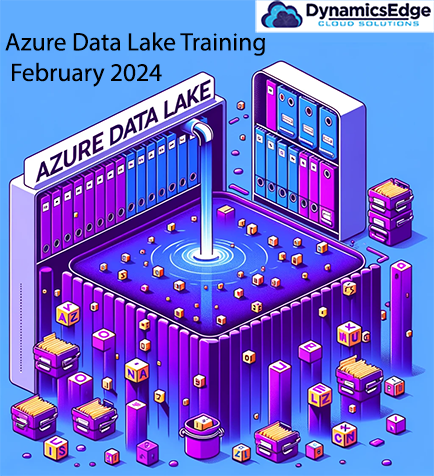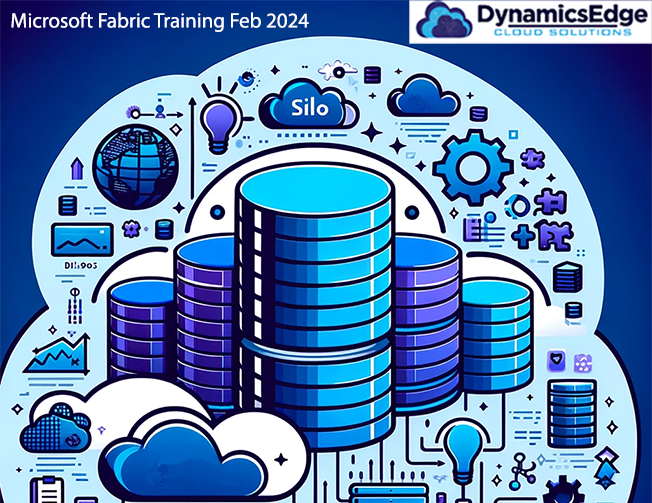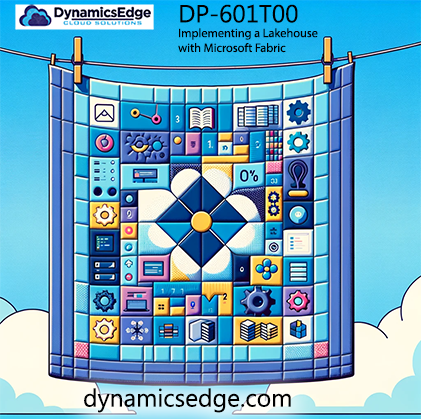In the constantly evolving landscape of data management and analytics, Microsoft Fabric and Azure Data Lake stand out as two prominent solutions. Their unique features and capabilities cater to diverse data needs across various industries.
Ask Dynamics Edge about how we can help you gain an in-depth understanding of these game-changing technologies, their differences, and their practical applications in scenarios such as electronics retail manufacturing and government data security.
Azure Data Lake: A Deep Dive

Azure Data Lake, designed to handle vast volumes of data, offers a unique set of features that distinguish it from traditional databases. It’s a storage repository capable of holding immense amounts of data in its raw format, optimizing for scaling to terabytes and petabytes. Unlike traditional databases which require data to be in a specific format, Microsoft Azure Data Lake stores data in its native, untransformed state. This approach is particularly beneficial in big data environments where the full potential of data might not be immediately evident.
In contrast to a flat file database, Azure Data Lake provides more scalability and flexibility, handling large, unstructured data sets more efficiently. Compared to a MySQL or a NoSQL database, it offers superior capability in storing and managing raw, unstructured, or semi-structured data, which these databases might not handle as efficiently. Furthermore, unlike memory caches, which are designed for quick, temporary data storage, Azure Data Lake is suited for long-term data storage and extensive analytics.
Microsoft Fabric: Evolution and Integration

Microsoft Fabric is seen as a natural successor to Azure Synapse Analytics, extending and enhancing its capabilities. It integrates various Microsoft technologies like Power BI, Data Factory, and Data Lake on a new generation of the Synapse data infrastructure. Fabric is delivered as a unified SaaS offering, aiming to reduce cost and time to value while enabling new capabilities in data science and analytics.
Azure Data Lake vs Microsoft Fabric
Azure Data Lake and Microsoft Fabric, while both pivotal in data handling, serve distinct purposes. Azure Data Lake excels in storing massive amounts of data in its raw form and is highly efficient in big data environments. Microsoft Fabric, on the other hand, functions more as an orchestration framework, integrating various Microsoft technologies to manage, process, and analyze data seamlessly. While Azure Data Lake focuses more on the storage aspect, Microsoft Fabric provides a broader platform for building and managing applications and workflow.
Azure Synapse Analytics: Bridging Data Warehousing and Analytics
Azure Synapse Analytics, a powerful analytics platform, integrates data warehousing and big data analytics.

It offers tools for ingesting, preparing, managing, and serving data for business intelligence and machine learning. Synapse Analytics functions as a large-scale storage system optimized for analysis and reporting, contrasting with Microsoft Fabric’s more comprehensive approach to data management and processing.
Practical Applications Across Industries
Electronics Retail Manufacturer
For an electronics retail manufacturer, Microsoft Fabric could streamline the production process by analyzing real-time data, ensuring the correct parts are used, and reducing errors. Azure Data Lake could complement this by storing historical data for trend analysis, improving supply chain efficiency.
US Federal Government
In a government setting prioritizing data security, Microsoft Fabric can develop secure systems for managing sensitive civilian data, ensuring robustness and compliance. Azure Data Lake’s vast storage capabilities would be instrumental in archiving large volumes of confidential data securely.
Entertainment Industry
For the entertainment industry, Microsoft Fabric can analyze consumer behavior to optimize event management and personalize experiences. Azure Data Lake can aid in complex data analyses on large datasets, providing insights into market trends and audience engagement.
Azure Fabric Data Lakehouse
The choice between Microsoft Fabric and Azure Data Lake hinges on specific data management needs. While Microsoft Fabric offers a comprehensive solution for data processing and application development, Azure Data Lake specializes in large-scale data storage and analysis. Understanding their distinct functionalities and integration capabilities is crucial for leveraging their full potential in various industrial scenarios. This understanding not only enhances data management strategies but also drives innovation and efficiency across diverse sectors.
DP-601 Training
Let’s delve deeper into the intricacies of Microsoft Fabric through DP-601T00—A: Implementing a Lakehouse with Microsoft Fabric – DP-601 training course.

This Microsoft Fabric training course is tailored for data professionals aiming to deepen their expertise in data engineering on Microsoft Fabric, focusing especially on the Lakehouse concept. DP-601T00 training may help you explore the capabilities of Apache Spark for distributed data processing and could help you delve into efficient data management, versioning, and reliability techniques, particularly working with Delta Lake tables. Additionally, it might also help you understand data ingestion and orchestration using Dataflows Gen2 and Data Factory pipelines.
Our high quality Microsoft Fabric Lakehouse training courses are structured to help you enhance your understanding of end-to-end analytics using Microsoft Fabric. Let Dynamics Edge guide you through your journey of getting started with lakehouses in Microsoft Fabric, configuring Spark in a Microsoft Fabric workspace, identifying suitable scenarios for Spark notebooks and jobs, and using Spark dataframes for data analysis and transformation. Moreover, Fabric Microsoft training emphasizes working with Delta Lake tables in Microsoft Fabric and creating Dataflow (Gen2) solutions to ingest and transform data. This comprehensive approach prepares professionals to utilize Microsoft Fabric’s full potential in practical, real-world scenarios!
For professionals like data analysts, engineers, and scientists, this DP-601 Microsoft course can be a pivotal step in understanding and leveraging the Microsoft Fabric platform. The Microsoft DP-601 training course emphasizes the concept of implementing a lakehouse with Microsoft Fabric, which is really integral in understanding how Microsoft Fabric orchestrates diverse data components into a cohesive analytical framework.
The DP-601T00 Microsoft Fabric Lakehouse DP-601 course offers insights into how Microsoft Fabric integrates various data sources and analytics tools to create a seamless environment for data management, processing, and analysis. This is especially relevant when considering the role of Azure Data Lake in this ecosystem. The course can help provide knowledge on how to effectively use apache spark within Microsoft Fabric, a key component in processing and analyzing large-scale data sets.
When it comes to specific industries, such as electronics retail manufacturing or government data security, understanding the principles and applications of Microsoft Fabric is invaluable. The course could help in visualizing how to implement solutions that leverage the combined strengths of Microsoft Fabric and Azure Data Lake, addressing specific challenges in these sectors.
More than just another run-of-the-mill training program, Microsoft DP-601T00 training course is a gateway to mastering Microsoft Fabric and its lakehouse architecture. It equips professionals with the skills and knowledge to create sophisticated data solutions, addressing complex data challenges and unlocking new opportunities in data analytics and management. Whether it’s about understanding the intricacies of data ingestion with Dataflows Gen2 or exploring the advanced analytics possibilities with Delta Lake tables, this Fabric Microsoft training course stands as a comprehensive resource for anyone looking to excel in the world of data engineering and analytics using Microsoft Fabric.
Have a Question ?
Fill out this short form, one of our Experts will contact you soon.
Call Us Today For Your Free Consultation
Call Now